Yuehan Qin
A Personalized Conversational Benchmark: Towards Simulating Personalized Conversations
May 20, 2025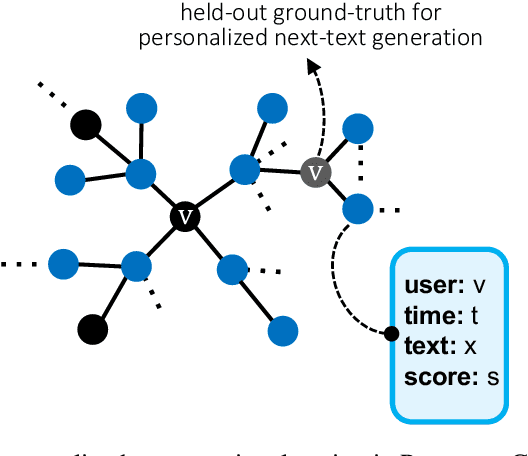
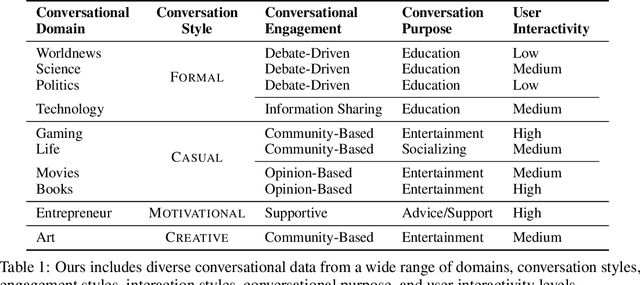
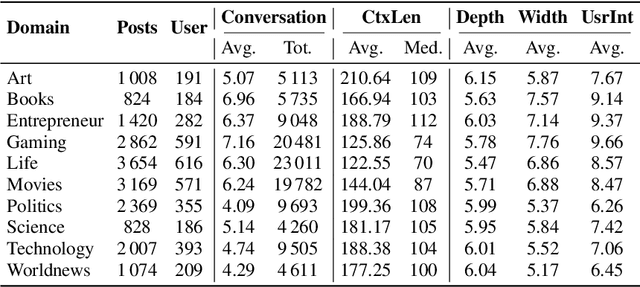
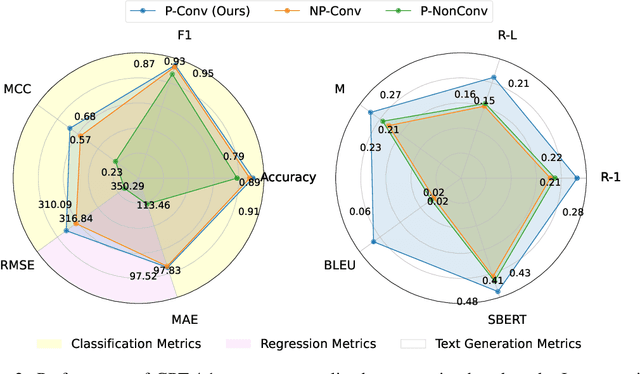
Abstract:We present PersonaConvBench, a large-scale benchmark for evaluating personalized reasoning and generation in multi-turn conversations with large language models (LLMs). Unlike existing work that focuses on either personalization or conversational structure in isolation, PersonaConvBench integrates both, offering three core tasks: sentence classification, impact regression, and user-centric text generation across ten diverse Reddit-based domains. This design enables systematic analysis of how personalized conversational context shapes LLM outputs in realistic multi-user scenarios. We benchmark several commercial and open-source LLMs under a unified prompting setup and observe that incorporating personalized history yields substantial performance improvements, including a 198 percent relative gain over the best non-conversational baseline in sentiment classification. By releasing PersonaConvBench with evaluations and code, we aim to support research on LLMs that adapt to individual styles, track long-term context, and produce contextually rich, engaging responses.
Don't Let It Hallucinate: Premise Verification via Retrieval-Augmented Logical Reasoning
Apr 08, 2025Abstract:Large language models (LLMs) have shown substantial capacity for generating fluent, contextually appropriate responses. However, they can produce hallucinated outputs, especially when a user query includes one or more false premises-claims that contradict established facts. Such premises can mislead LLMs into offering fabricated or misleading details. Existing approaches include pretraining, fine-tuning, and inference-time techniques that often rely on access to logits or address hallucinations after they occur. These methods tend to be computationally expensive, require extensive training data, or lack proactive mechanisms to prevent hallucination before generation, limiting their efficiency in real-time applications. We propose a retrieval-based framework that identifies and addresses false premises before generation. Our method first transforms a user's query into a logical representation, then applies retrieval-augmented generation (RAG) to assess the validity of each premise using factual sources. Finally, we incorporate the verification results into the LLM's prompt to maintain factual consistency in the final output. Experiments show that this approach effectively reduces hallucinations, improves factual accuracy, and does not require access to model logits or large-scale fine-tuning.
Treble Counterfactual VLMs: A Causal Approach to Hallucination
Mar 08, 2025



Abstract:Vision-Language Models (VLMs) have advanced multi-modal tasks like image captioning, visual question answering, and reasoning. However, they often generate hallucinated outputs inconsistent with the visual context or prompt, limiting reliability in critical applications like autonomous driving and medical imaging. Existing studies link hallucination to statistical biases, language priors, and biased feature learning but lack a structured causal understanding. In this work, we introduce a causal perspective to analyze and mitigate hallucination in VLMs. We hypothesize that hallucination arises from unintended direct influences of either the vision or text modality, bypassing proper multi-modal fusion. To address this, we construct a causal graph for VLMs and employ counterfactual analysis to estimate the Natural Direct Effect (NDE) of vision, text, and their cross-modal interaction on the output. We systematically identify and mitigate these unintended direct effects to ensure that responses are primarily driven by genuine multi-modal fusion. Our approach consists of three steps: (1) designing structural causal graphs to distinguish correct fusion pathways from spurious modality shortcuts, (2) estimating modality-specific and cross-modal NDE using perturbed image representations, hallucinated text embeddings, and degraded visual inputs, and (3) implementing a test-time intervention module to dynamically adjust the model's dependence on each modality. Experimental results demonstrate that our method significantly reduces hallucination while preserving task performance, providing a robust and interpretable framework for improving VLM reliability. To enhance accessibility and reproducibility, our code is publicly available at https://github.com/TREE985/Treble-Counterfactual-VLMs.
PyOD 2: A Python Library for Outlier Detection with LLM-powered Model Selection
Dec 11, 2024
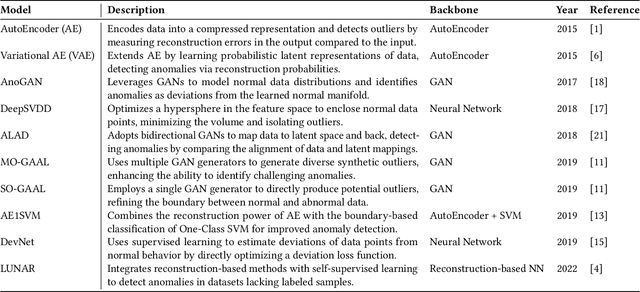

Abstract:Outlier detection (OD), also known as anomaly detection, is a critical machine learning (ML) task with applications in fraud detection, network intrusion detection, clickstream analysis, recommendation systems, and social network moderation. Among open-source libraries for outlier detection, the Python Outlier Detection (PyOD) library is the most widely adopted, with over 8,500 GitHub stars, 25 million downloads, and diverse industry usage. However, PyOD currently faces three limitations: (1) insufficient coverage of modern deep learning algorithms, (2) fragmented implementations across PyTorch and TensorFlow, and (3) no automated model selection, making it hard for non-experts. To address these issues, we present PyOD Version 2 (PyOD 2), which integrates 12 state-of-the-art deep learning models into a unified PyTorch framework and introduces a large language model (LLM)-based pipeline for automated OD model selection. These improvements simplify OD workflows, provide access to 45 algorithms, and deliver robust performance on various datasets. In this paper, we demonstrate how PyOD 2 streamlines the deployment and automation of OD models and sets a new standard in both research and industry. PyOD 2 is accessible at [https://github.com/yzhao062/pyod](https://github.com/yzhao062/pyod). This study aligns with the Web Mining and Content Analysis track, addressing topics such as the robustness of Web mining methods and the quality of algorithmically-generated Web data.
MetaOOD: Automatic Selection of OOD Detection Models
Oct 04, 2024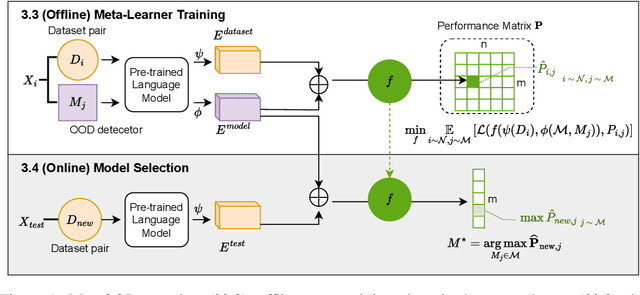
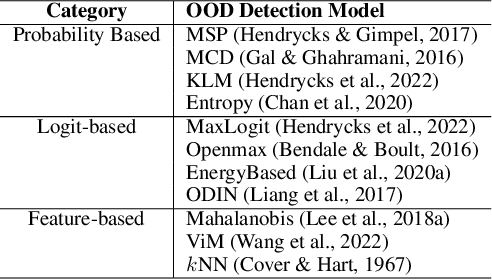

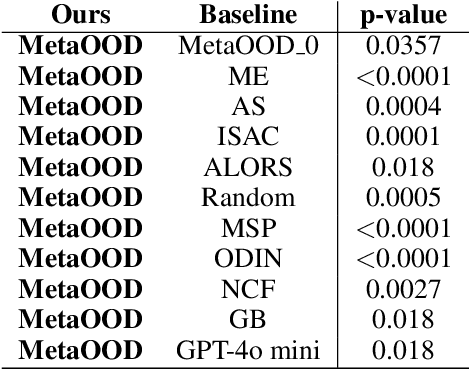
Abstract:How can we automatically select an out-of-distribution (OOD) detection model for various underlying tasks? This is crucial for maintaining the reliability of open-world applications by identifying data distribution shifts, particularly in critical domains such as online transactions, autonomous driving, and real-time patient diagnosis. Despite the availability of numerous OOD detection methods, the challenge of selecting an optimal model for diverse tasks remains largely underexplored, especially in scenarios lacking ground truth labels. In this work, we introduce MetaOOD, the first zero-shot, unsupervised framework that utilizes meta-learning to automatically select an OOD detection model. As a meta-learning approach, MetaOOD leverages historical performance data of existing methods across various benchmark OOD datasets, enabling the effective selection of a suitable model for new datasets without the need for labeled data at the test time. To quantify task similarities more accurately, we introduce language model-based embeddings that capture the distinctive OOD characteristics of both datasets and detection models. Through extensive experimentation with 24 unique test dataset pairs to choose from among 11 OOD detection models, we demonstrate that MetaOOD significantly outperforms existing methods and only brings marginal time overhead. Our results, validated by Wilcoxon statistical tests, show that MetaOOD surpasses a diverse group of 11 baselines, including established OOD detectors and advanced unsupervised selection methods.
 Add to Chrome
Add to Chrome Add to Firefox
Add to Firefox Add to Edge
Add to Edge